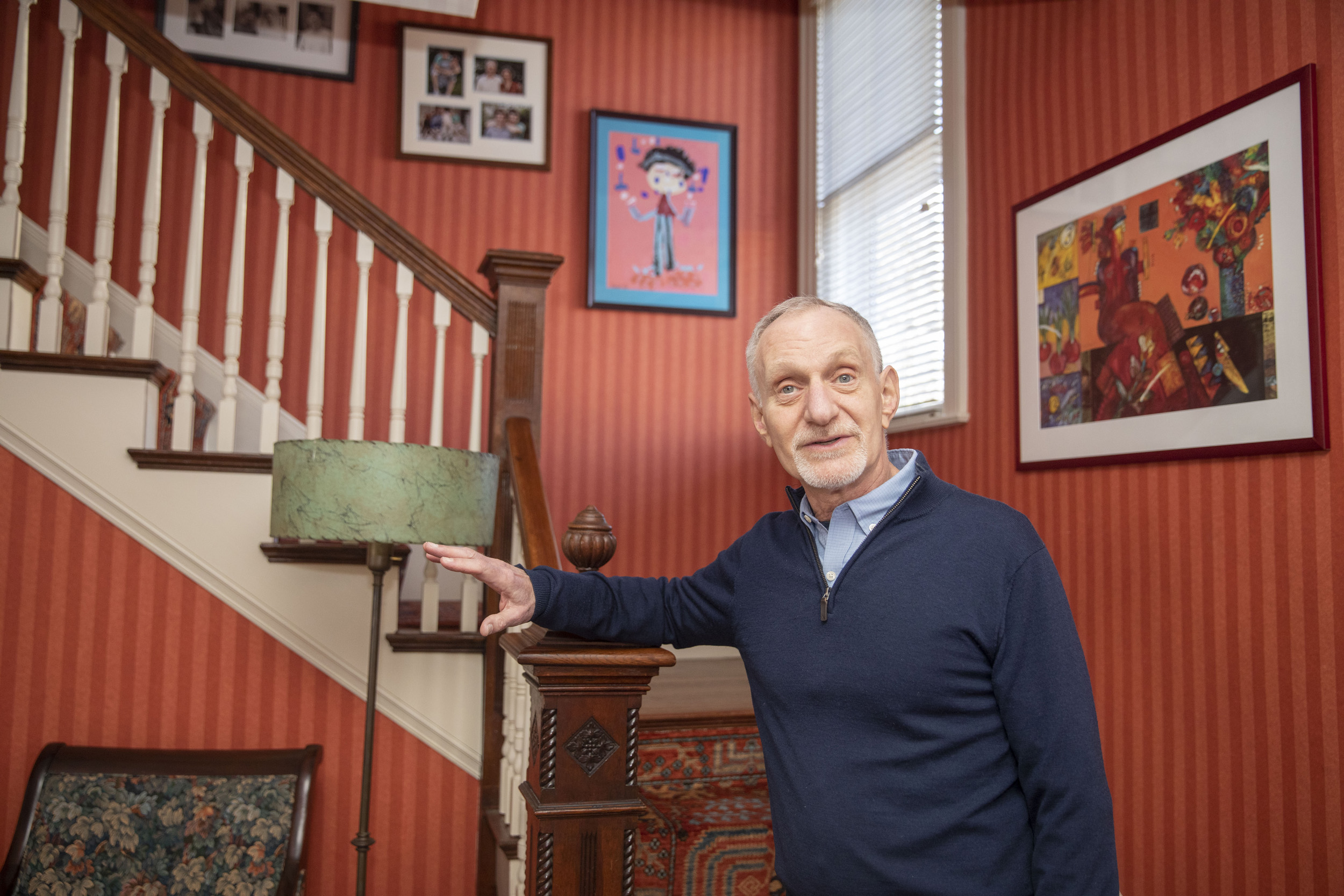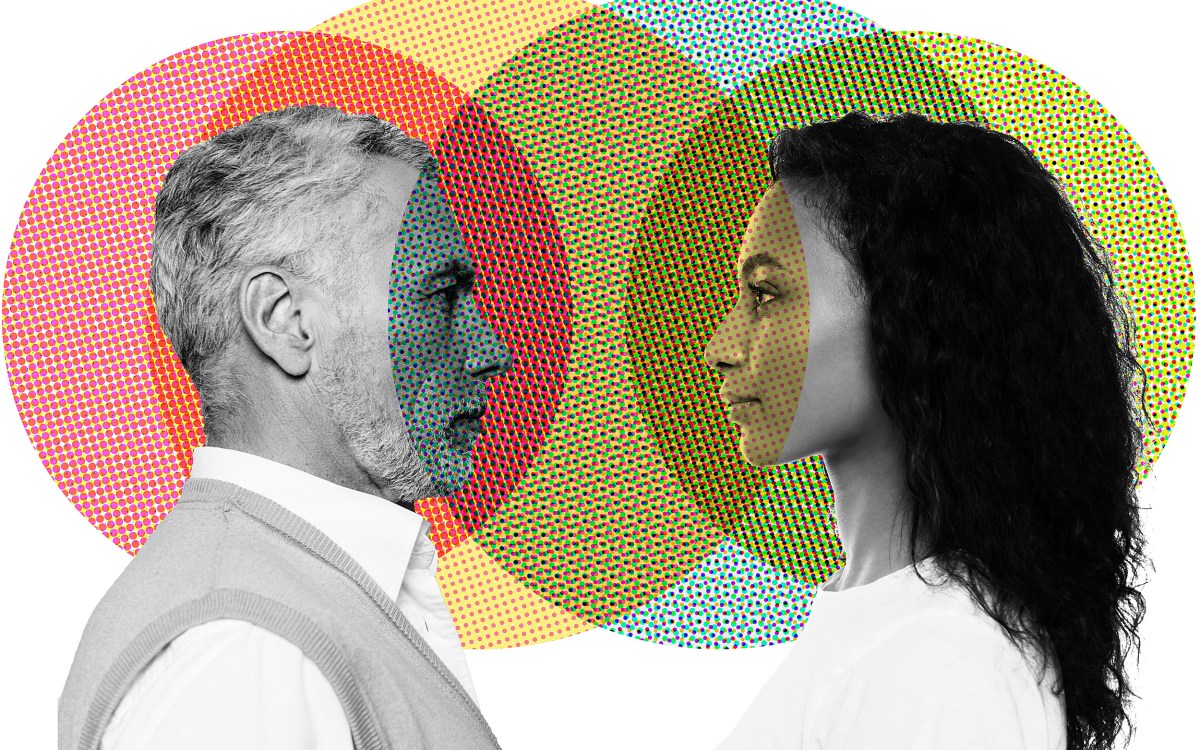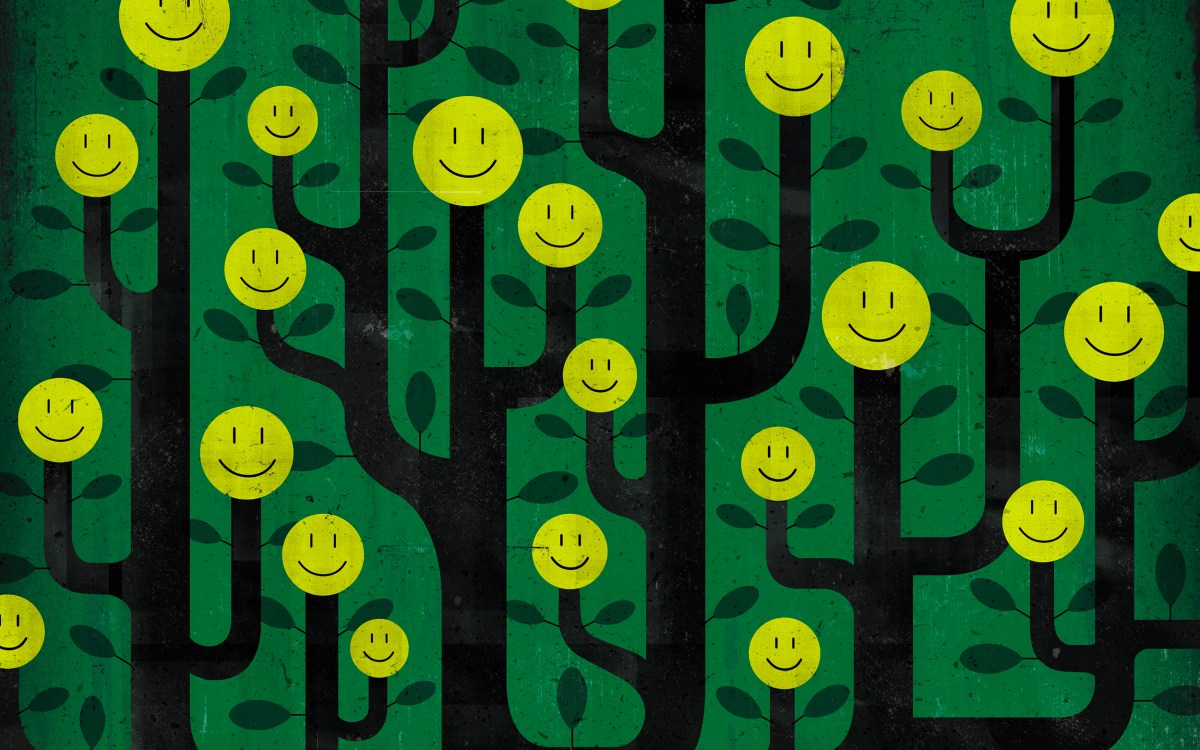
Robert Waldinger talks about the findings from an 85-year-long Harvard study of adult life and what the good life really looks like.
Kris Snibbe/Harvard Staff Photographer
Work out daily? OK, but how socially fit are you?
Book by Harvard Study of Adult Development director details what research says about value of relationships to physical, mental health
Robert Waldinger, director of the Harvard Study of Adult Development, says one of the biggest surprises they encountered was that what makes people happy is also what helps keep them healthy — relationships. The research project, the longest in-depth study of physical and mental well-being among adults, began in 1938 with 724 participants: 268 Harvard College sophomores and 456 young adults from Boston. It now includes 1,300 descendants of its original participants. The Gazette spoke with Waldinger about his new book, “The Good Life,” which he co-wrote with Marc Schulz. The interview has been edited for length and clarity.
Q&A
Robert Waldinger
GAZETTE: One of the conclusions of your book involves how key good relationships are to both physical as well as mental well-being. Were researchers expecting that to be true?
WALDINGER: As part of the study, we followed our first generation of participants through their entire adult lives — from teenage years all the way into old age. When they reached age 80, we realized we had all these data about their physical and mental health, which we had collected year after year after year.
We started wondering whether we could look back at our participants’ lives in middle age and see what the biggest predictors were of who’s going to be happy and healthy by age 80. We thought that cholesterol level or blood pressure at age 50 would be more important. They were not. It was satisfaction in their relationships, particularly in their marriages, that was the best predictor of a happy and healthy life.
At first, we didn’t believe it; we were wondering how this could be possible. We thought, “It makes sense that if you have happy relationships, you’ll be happier, but how could the quality of your relationships make it more or less likely that you would get coronary artery disease or Type 2 diabetes or arthritis?” We thought maybe this isn’t a real finding, maybe it’s by chance. Then other research groups began to find the same thing. Now it is a very robust finding. It’s very well established that interpersonal connectedness, and the quality of those connections, really impact health, as well as happiness.
“[I]f you are alone and feel stressed and lonely, that’s part of what breaks down your health. That’s why we think loneliness is as dangerous to your health as smoking half a pack of cigarettes a day or being obese.”
GAZETTE: Is there solid medical evidence that supports how good relationships might affect physical health?
WALDINGER: Some people might think this finding is very touchy-feely, right? The question you are asking is exactly what researchers were asking, which is, “How does that work? What would the mechanism be by which relationships affect physiology?” We have spent the last 10 years in our lab studying this. The best hypothesis for which there are good data suggests that it is about stress and the regulation of stress by our relationships.
First, stress is a natural part of life. It happens every day to most of us: Something will come along that will stress us, and when that happens, the body goes into fight-or-flight mode. When that happens, you can feel your heart rate increase, your blood pressure goes up, you might start to sweat, and that’s normal because we want the body to prepare itself to meet a challenge. But when the challenge is removed, we want the body to go back to equilibrium. For example, if I have something upsetting happen during the day, and I’m churning or ruminating about it, I go home and talk to my wife or a friend, and if that person is a good listener, I can literally feel my body calm down.
But if you don’t have anyone like that, and many people don’t, if you are isolated or you don’t have a confidant, what we think happens is that the body stays in a kind of low-level fight-or-flight mode, and that means that there are higher levels of circulating stress hormones and higher levels of inflammation, and those things can gradually wear away many body systems. That’s how we think stress can wear down multiple body systems and how good relationships can be protective of our health.
GAZETTE: How about career and financial success? Are they as important as good relationships?
WALDINGER: Certainly, having a job you enjoy or care about and find meaningful is important. Having a job you hate lowers your well-being for sure. But what we know from good studies is that wealth does not increase well-being significantly once we have our basic needs met. Once you get beyond basic financial security, your happiness doesn’t go up very much.
Similarly, fame or high achievement — becoming a Harvard professor or winning the Nobel Prize — won’t make you happier. Maybe the work that got you the Nobel Prize is meaningful to you, and that can make you happy. But the badges of achievement and the badges of wealth don’t make people happy. That’s important to keep in mind because we tell each other a lot of stories about what’s going to make us happy. We get these messages all day long from ads that convey the message that if you just buy this thing, you’ll be happier, or they show people living these beautiful and wealthy lives, and that’s the key to a happy life. It turns out that’s not true.
“What we see in our research is that everybody needs at least one solid relationship, someone whom they feel they can count on in times of need.”
GAZETTE: Your book highlights the importance of having good relationships with your parents, siblings, neighbors, coworkers, even acquaintances. Can you expand on that?
WALDINGER: There’s no set number of connections you need to have. If you have everything you need in your family, that’s great. Maybe, you don’t need a wider circle. But what we find is that the benefits of relationships come from anywhere. They certainly come from family, but they can come from friends, from work colleagues, and we even get small bits of well-being from a chat with the person who makes coffee for us in the coffee shop or from a chat with the cashier who checks us out in the grocery store, or the mail carrier. If we have pleasant connections with those people, those also contribute to our well-being.
Some of us are more shy, and some of us are more extroverted. Shy people need fewer relationships whereas an extrovert needs more. What we see in our research is that everybody needs at least one solid relationship, someone whom they feel they can count on in times of need. In one of our questionnaires, we asked our participants, “Who could you call in the middle of the night, if you were sick or scared? List everybody.” Most people could list several people, but some people, even some who were married, couldn’t list anyone. We think that everybody needs at least one person that you know would be there for you.
“Our social life is a living system, and it needs maintenance too. One of the ways you can do it is through tiny actions.”
GAZETTE: What is the impact of loneliness on your physical health? In your book you write that loneliness could be as dangerous to your health as smoking or being obese.
WALDINGER: We think that it operates through this mechanism of chronic stress — that loneliness is a stressor. We evolved to be social creatures because it was safer to be in a group. If you think about when we were trying to survive out in the wilderness, you realize that people who banded together survived longer. We hypothesize that there was genetic selection for being more social. Being alone is a stressor; being isolated is a stressor. Many people feel chronically unsafe when they are lonely. If you’re alone and you’re content, that’s different. But if you are alone and feel stressed and lonely, that’s part of what breaks down your health. That’s why we think loneliness is as dangerous to your health as smoking half a pack of cigarettes a day or being obese. Loneliness has a similar physiologic fingerprint as those other two problems.
GAZETTE: What if people feel it’s too late in life to have good relationships?
WALDINGER: What we find in following thousands of people is that many people who thought it was too late for them, who thought, “I’m no good at relationships,” found relationships at a time when they didn’t expect to. We have a story in the book of one man who retired. He didn’t have a good marriage, and he never had friends. He joined a gym, and he found a group of friends who became his tribe, and they started socializing together. And he wrote to us that he was happy in a way he had never been because he had these people in his life. We find people who find love in their 70s and 80s who never expected it. Based on our science, we can say that it’s never too late. And if you think you’re never going to have good relationships, you don’t know that for sure. It’s worth the effort. People can make an effort.
GAZETTE: What steps should people take to start working on building good relationships?
WALDINGER: We talk in the book about what we call “social fitness.” The reason we call it that is to frame it as analogous to physical fitness. We think of physical fitness as a practice, as something we do to maintain our bodies. Our social life is a living system, and it needs maintenance too. One of the ways you can do it is through tiny actions. You could think right now, “Whom do I miss? Who would I like to see more of? Who haven’t I been in touch with?” and send them a text, an email, or call them on the phone. You will be amazed at the positive responses that you get for this tiny action.
The piece of advice I’d like to give is that there are some small actions we can take to enliven our social world. The other thing is to think about how you could make new connections, and probably one of the easiest ways to do that is to do something you care about or enjoy doing and do it alongside other people. It could be a bowling league, a gardening club, a knitting group, a political campaign, or working to prevent climate change. Just remember that when you do something you care about in a group, you already have something in common with the people you’re with. It’s a natural place to start conversations, and what we find is that when people repeatedly have casual contact with the same people, that’s the easiest place to start deepening relationships.
One last point I want to make is that nobody is happy all the time. That’s important to know because we can end up believing that if we’re not happy all the time, we’re doing something wrong. No life is happy all the time. Every life is filled with challenge and hard times. This idea about strengthening relationships is a way to increase our happiness, but also to build a safety net that helps us weather those hard times that all of us have in our lives.









